Frontline Reports
Confronting Conflict with Humanity and Hope
How we’re leaning into humanitarian principles to make a difference in the Israel-Gaza crisis.
Lately, I’ve been getting questions from my family and friends about the ongoing conflict in Gaza. I know it can feel overwhelming, confusing, and downright heartbreaking. The scars of the Hamas attacks on Israeli farming communities last October are still fresh, innocent people have died in large numbers, and the war drags on with no end in sight. But amidst the chaos, your generosity has helped World Relief make an impact.
World Relief has directly supported many organizations on the ground. We’ve provided aid within Gaza, on the border in Egypt, and to Israelis and Palestinians on the West Bank. Here’s just a glimpse of what has been possible:
- Medicines and Medical Supplies: Over 50,000 people have received medicines, medical supplies or lifesaving healthcare.
- Water and Sanitation: We’ve provided latrines and water filtration systems to meet the needs of internally displaced people.
- Food and Basic Necessities: Countless families have received the essentials to survive this brutal war.
Of course, these conversations often come around to the hard questions. “What’s really happening?” and “What do you think?” In crises like this, there are so many conflicting reports and strong opinions on all sides. There are powerful forces at play with hardline agendas, but there are also humanitarians, like World Relief and our partners, working tirelessly to value and uphold the sanctity of every human life amidst the turmoil.
Humanitarians engage in these conflicts driven by a shared set of principles: humanity, impartiality, neutrality, and independence. These aren’t just words to us; they’re the very foundation of our work. This means we believe in:
- Humanity: Protecting life, health, and ensuring respect for all human beings; do no harm.
- Impartiality: Aid based solely on need, prioritizing the most urgent needs first.
- Neutrality: Addressing human suffering wherever it’s found, without taking sides.
- Independence: Humanitarian aid and action must be autonomous from political, economic, military, or other objectives that any actor holds.
There are several ways I invite my family and friends and the broader World Relief community to embrace these values. First, you can look for God in the face of those who suffer. Jesus taught us that when we serve those in need, we’re serving him (Matthew 25:40-45). All human beings are created in the image of God. This is the bedrock of humanity as a value, and the reason why we do whatever we can to protect life and health in conflict settings.
Second, you can acknowledge suffering and needs do not discriminate in a conflict. In your conversations, note suffering that happens to anyone, especially to those with whom you disagree.
Third, you can give. Even a few dollars might provide bandages for a wound, safe shelter, or emergency transportation.
Fourth, you can advocate for safe corridors for humanitarian aid. Delivering lifesaving aid in conflict zones like Gaza is incredibly challenging. Aid workers lives have been lost (some targeted and some due to the general lack of protection for civilians), barriers to aid have been erected, and the combined loss of life and damage to infrastructure has gravely hit even the most basic of services. Safe corridors for delivering aid are crucial, and we need those in power to commit to providing them.
Lastly, and most importantly, you can pray. While we may not have the power to change everything, your prayers are vital. They make a real difference. Your prayers join with the Holy Spirit, who works with the same power that raised Christ from the dead (Romans 8:26-27). It’s this faith and hope that keep me going, knowing that God is greater than anything that stands against us (Romans 8:31).
Your alignment with us in values, in conversations, in giving, in advocacy, and in prayer is a beacon of hope. Together, we can still make a difference in the face of this heartbreaking conflict, one act of generosity and love at a time.
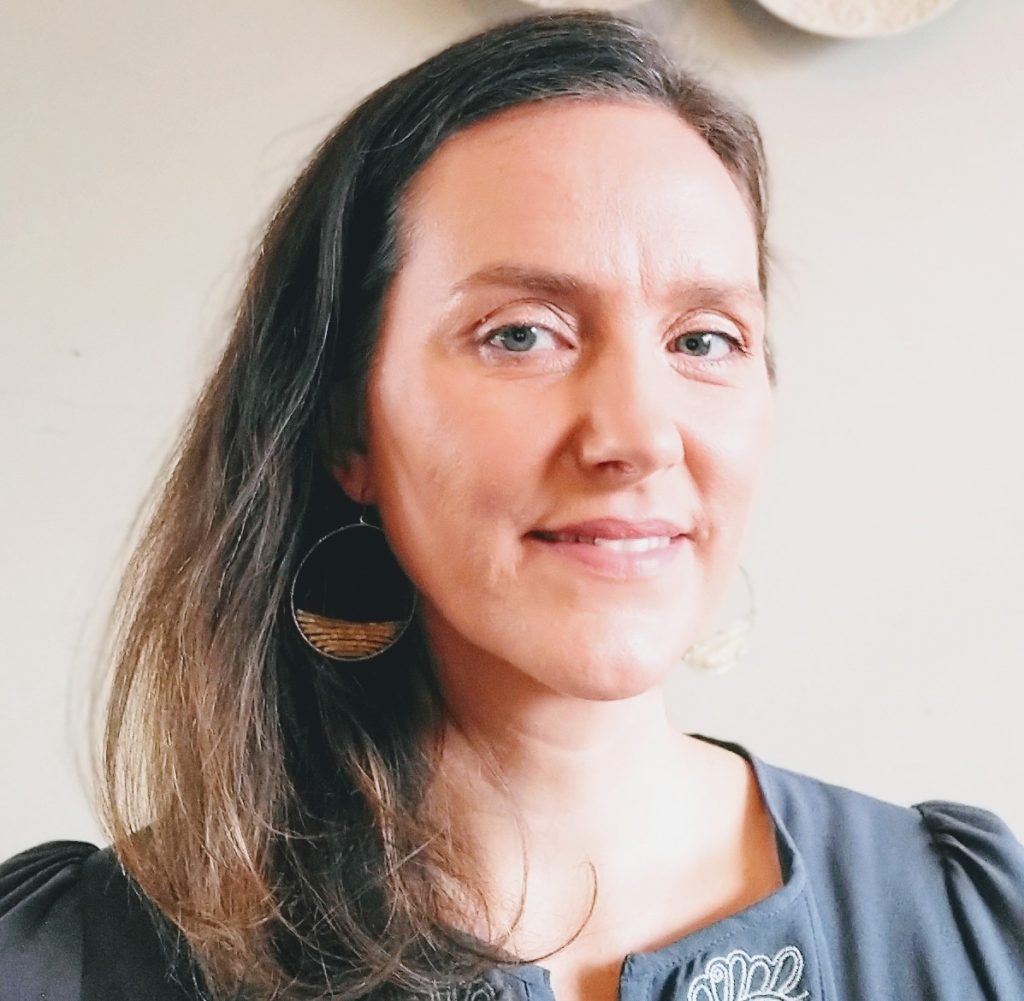
Emily Chambers Sharpe is the Director for Health, Nutrition, and WASH in World Relief’s International Programs Department. She has held various senior management and technical roles in humanitarian health and nutrition and community-based HIV programs. She has many years of experience with health and nutrition programs in conflict settings in Sudan and throughout the Middle East. Emily earned her MPH from Boston University School of Public Health. She lives in Charlotte, NC with her husband Rob and their three sons.
How is World Relief Helping Refugees in Chad?
We cannot let them go hungry during their Eid. We cannot see them crying when it is supposed to be a celebration of triumph.
Did you know, the country of Chad hosts the second-highest number of refugees per capita in Africa? It’s one of the reasons we opened a new office in Chad earlier this year. And yet, we couldn’t have foreseen that the recent conflict in Sudan would push more than 179,000 new refugees into Chad. We have been placed for such a time as this.
Prior to this conflict, Chad had already welcomed nearly 600,000 refugees including individuals from Sudan, the Central African Republic, Niger and Cameroon. As one of the poorest nations in the world, Chad does not have the resources to handle the mass influx of refugees from Sudan.
An urgent humanitarian crisis is rapidly unfolding at the Chadian border. Like you, our hearts are broken and we’re ready to respond. Today, we’re sharing an update on the evolving crisis and how you can help refugees in Chad.
Who are the refugees arriving in Chad?
The current influx of refugees are from Sudan, specifically West and Central Darfur. Most of those arriving are women and children as it is almost impossible for men from certain tribes in West and Central Darfur to make the journey due to the targeting of males from different tribes.
What makes this situation especially unique is that World Relief has a personal connection to many of the refugees entering Chad. These are families and individuals that we’ve served through our office in Sudan. Our teams have known these people for a long time and have built relationships with them. They have walked alongside and witnessed their Darfurian brothers and sisters regrow decimated communities and rebuild livelihoods. The response to this current crisis is deeply personal as much as it is professional.
Many refugees arriving in Chad are doing so without food, water, shelter and other protection measures. Many will face hunger, thirst, exploitation or even death. There is an immediate and urgent need to respond in order to save the lives of the people who are facing some of the most dire circumstances imaginable.
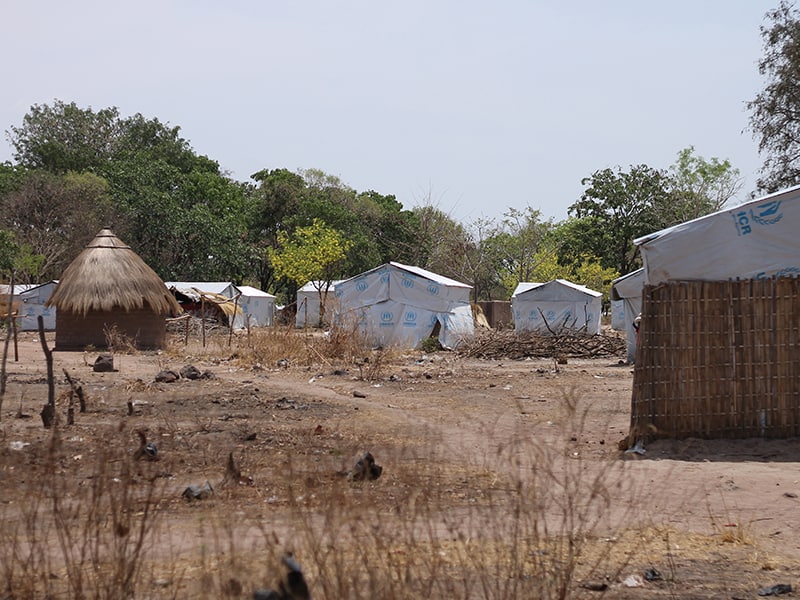
Tragedy During the Holiday Season
To make things even more challenging, many Sudanese people find themselves away from home, in a foreign land, during the coming Eid-al-Adha — one of the most significant holidays celebrated in Islam.
The word Eid, which means “feast or festival” is used to refer to two major holidays. For our Muslim brothers and sisters, Eid al-Adha, or the “Feast of Sacrifice,” falls on June 28th this year. The holiday honors Abraham’s willingness to sacrifice his son in obedience to God’s command and is a time when many Muslims give generously to help those in need. Today, they should be celebrating with family, friends, neighbors and relatives. Instead, they have been displaced in a foreign land.
Despite religious differences, as Christians, we are commanded to take care of our fellow human beings. As Matthew 25:40 says (NIV), “Truly I tell you, whatever you did for one of the least of these brothers and sisters of mine, you did for me.”
We pray for our brothers and sisters who are experiencing life’s most heartbreaking circumstances. May they feel seen, heard and protected during the Eid and throughout their journey in refugee camps.
How You Can Help Refugees in Chad
An emergency response team composed of World Relief staff from around the world arrived in Chad on June 12, 2023 to support World Relief’s Chad office in a cross-border refugee response. There are reports of mass casualties and bodies waiting to be buried along the border. A horrific and heartbreaking scene.
Crisis response is a tangible way for us to extend the love of Christ to those who are suffering in their greatest time of need. We cannot control when a crisis strikes. But when it does, God calls you and me to respond with compassion – wherever and whenever help is needed most.
We invite you to join us in prayer and by giving to our response effort in Sudan and Chad. World Relief is aiming to raise $400,000 for this response. One hundred percent of funds raised will be used for direct aid for vulnerable families impacted by this crisis.
With your help:
- $10 can provide water for a family
- $20 can provide clothes for a child
- $30 can provide meals for a family for a day
- $75 can provide blankets and a solar lamp
Your generosity will go directly to teams on the ground in Chad to provide a safe haven for Sudanese refugees with access to food, clean water, basic necessities and temporary shelter. It will also help families pay for burial expenses for the loved ones they’ve lost.
For nearly 80 years, World Relief has been responding to crises and disasters, providing emergency relief and building resilience where and when it’s needed most. It is our desire and hope to see a world free from suffering and injustice.
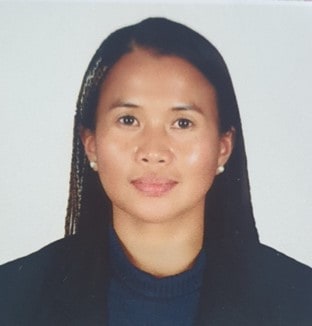
Carrell Cataya Magno is Protection Program Manager at World Relief Sudan.
Carrell has nearly 20 years of experience working in complex humanitarian environments. She has background in general protection, human rights, violence prevention, community empowerment and coordination of humanitarian response. Prior to joining World Relief, she worked with Nonviolent Peaceforce in South Sudan for more than six years. She also worked with a number of NGOs in the Mindanao region of the Philippines, and she has extensive experience working in remote locations. Carrell has demonstrated success in negotiating with armed actors at the local level for access for humanitarian workers (both her own team and others) and protection of civilians’ rights. Carrell holds a Bachelor of Arts in Community Development from the University of the Philippines and a diploma in Sustainable Development Studies from Mindanao State University.
Refugee Stories: Meet Malian
There’s someone we’d like you to meet. At just 16, Malian was forced to flee his home in Burma. For the next 15 years, he and his young family waited for a place where they could rebuild their lives. This is his refugee story.
Every June, we invite people like you to celebrate World Refugee Day — a day that honors the strength, courage and refugee stories of people like Malian. Will you help ensure more families like his can find a safe place to call home?
4 Things to Know About Recent Conflict in Democratic Republic of the Congo
A new surge of conflict in Democratic Republic of the Congo is exacerbating one of the most neglected displacement crises in the world.
Recently, our team visited one of the large camps for internally displaced people (IDP) located on the outskirts of Goma. We spoke with pastors and members of World Relief’s Church Empowerment Zones who had been displaced.
We talked with women and youth, as well as church leaders and municipal authorities who are handling displacement issues. Everywhere we went, people expressed deep sorrow for the families who have lost loved ones due to the cholera epidemic in the camps, for the sisters and wives who have been raped amidst the conflict, for the thousands of children who cannot go to school and are stuck on the main roads with their families.
In all my years of working in the humanitarian and disaster response sector, I have witnessed terrible misery and despair. But what is currently happening in DR Congo is truly mind-boggling. For all those in these camps who have been displaced many times before, they are remembering past conflicts and displacements with great vividness.
While the crisis is heartbreaking, the long slow work of change continues taking shape. At World Relief we’re committed to assisting the local pastors, activists and community members who are fighting for change within their own communities.
Today, we’re sharing four things you need to know about the most recent conflict in Democratic Republic of the Congo and why it matters to World Relief. Let’s dive in.
1. The current conflict is centered in the North Kivu province, near Goma City.
In August 2022, clashes resumed between DR Congo’s military and rebel group M23. For the last decade, the rebel group had largely been held at bay. But the resurgence of violence triggered a new wave of displacement, violence and hunger in the country’s North Kivu province.
The cause of this conflict and the ongoing driving factors are incredibly complex and hotly debated. Since fighting began, the M23 has been active in a large portion of the North Kivu province, surrounding the capital of Goma. In February, the group advanced toward the city causing widespread panic in the region. While they did not reach the city and a ceasefire was put in place, many continue to live in fear and uncertainty.
2. More than 5.5 million people have been displaced as a result of the conflict.
Most of these families and individuals are now living in both formal and informal settlements for internally displaced people (IDPs).
Basic services including access to food and water, are scarce in camps. A recent report by the International Red Cross indicates that 93% of IDPs recently settled in camps in and around Goma are in dire need of essential household items like blankets, cookware and fabric.
Over the last year, education has been disrupted for more than 600,000 children in North Kivu.
Prior to this conflict, many of these individuals and families were living successful self-sustaining lives as farmers, traders, transporters, etc. But in the rush to escape the violence, they left everything behind and it’s unclear when it will be safe to return to their homes.
3. People in DR Congo desperately want peace.
While DR Congo is home to more than 100 armed groups operating in the eastern region, citizens are actively finding ways to come together and creatively pursue peace.
Artists in Goma are painting murals to amplify their call for peace and urge people to reject violence. Women across eastern DR Congo are mobilizing their communities, strengthening connections between local authorities and the communities in which they work, documenting human rights abuses and holding perpetrators accountable.
Though the loudest and most consistent narrative coming out of DR Congo is one of war and pain, the strength, resolve and collective push for development and healing must not be overlooked. In fact, much of World Relief’s work in the region is spearheaded by local pastors and community members who are working together to unite churches and build peace.
4. World Relief has been partnering with communities in DR Congo for more than two decades and staff are responding now.
Since 2001, World Relief has been working to address the root causes of conflict in Democratic Republic of the Congo and facilitate stability and healing in the country. Village Peace Committees were piloted in the early 2000s as part of an ongoing initiative to disrupt cycles of revenge that have the potential to escalate to violence by focusing on reconciliation and forgiveness.
Today, we’re responding in the hardest hit regions near Goma providing food and non-food items as well as hygiene and sanitation aid.
In partnership with local church groups, IDP committees and other NGOs, World Relief is identifying those facing the most acute hunger needs, prioritizing female-led households, people with disabilities and the elderly. Monthly food distributions, consisting of beans, maize, oil and salt, will provide for 100% of household emergency nutritional needs based on internationally-recognized standards.
Learn More
DR Congo faces one of the most complex and neglected humanitarian crises of our day. While this may not be making headline news, it’s affecting millions of people. Their stories matter and we believe it’s important to stay informed beyond the headlines.
Linked below are several stories from DR Congo and from Congolese refugees who are now living in the United States, as well as a few recommended resources for learning more about the history of DR Congo.
Stories from DR Congo:
- Change United to Bring Peace and Restoration
- World Relief DR Congo is Building Resilience from Ashes
- Global Peace Starts With Us
- Frontline Report: Democratic Republic of Congo
Congolese Refugee Stories
- Worth the Wait: A Story of Faith, Hope and Perseverance Despite the Odds
- From DRC to the 253: A Blacklisted Journalist Hasn’t Given Up Working or a Better Congo
- Rebuilding Welcome in Memphis
Learn More About DR Congo

Charles Franzén has been working in humanitarian and disaster response sector for more than 25 years. Prior to assuming the role of Humanitarian and Disaster Response Director at World Relief, he served as the Country Director in Democratic Republic of Congo for five years.
What’s Happening in Sudan?
By now, we know you’ve seen the news coming out of Sudan. On Saturday, April 15, heavy fighting broke out between two military forces under the command of General Abdel Fattah al-Burhan (SAF) and General Mohammed Hamdan Dagalo (RSF), also known as General Hemeti.
While the fighting started in Khartoum, Sudan’s capital city, it has since spread throughout the country causing food, fuel and water shortages in some areas.
Here’s What’s Happening Now
As we’re writing, at least 512 deaths and more than 4,200 injuries have been reported. These numbers are growing daily.
We’re grateful to report that all of our in-country staff are safe and accounted for. They are sheltering in place and checking in on one another while they wait for the fighting to subside.
At this time, humanitarian activities have been paused to keep staff from World Relief and other NGOs safe. USAID has set up a rapid response team in Nairobi to assess the situation and provide emergency aid to people fleeing into the neighboring countries of Chad and South Sudan.
As you might recall, World Relief recently opened its newest office in Chad. The location of our office there puts us in close proximity to Sudanese refugees who are fleeing. At this time, we do not know if a response in Chad will be possible, but our teams are monitoring the situation and staying open to needs as they arise.
Why is This Happening?
This current conflict can be traced back to April 2019 when Sudanese protestors peacefully took to the streets and removed former President Omar al-Bashir. Following the coup, a military-led council took power, prompting another series of protests which have continued into the present day. We shared more about this in a previous post about some of our world’s most neglected crises.
While the latest conflict is most certainly a setback for Sudan, we remain hopeful and committed to long-term development in Sudan and have a long history of working alongside local partners there. Josh Meares, World Relief Sudan Country Director said:
“We do not know what the future holds for Sudan… It is a nation that deserves better than this, and we have a great staff there who are capable of leading the country into a better future if given the chance. We will continue to stand together with and for the most vulnerable.”
Why Does This Matter to Me and World Relief?
Sudan has long been a crossroads between the Middle East and Africa. Though rich in cultures and resources, decades of colonization, civil conflict and climate disasters have made Sudan one of the most vulnerable countries on earth.
Prior to this most recent conflict, 3 million people were already living as internally displaced in Sudan, and 15 million were at risk of acute food insecurity. The return to conflict is likely to exacerbate an already difficult situation for people experiencing the greatest vulnerability.
World Relief has been on the ground in Sudan, working to address these problems since 2004. Outside the U.S., Sudan is our largest country of operation with more than 345 staff who are committed to building flourishing communities and moving lasting change forward.
In 2022 alone, the team reached more than 533,000 men, women and children in Sudan with life-transforming resources, training and care.
It Matters in the U.S., Too
Not only does World Relief work in Sudan, but we have a rich history of welcoming refugees from Sudan to communities across the United States.
You may remember reading about people like Darelsalam who came to the U.S. when she was 14 years old, or Ibrahim who arrived in North Carolina after being separated from his family for 10 years.
Over the years, World Relief has welcomed more than 2,000 Sudanese refugees to the U.S. — this number includes people from both Sudan and South Sudan, which gained independence in 2011 — and we currently have many Sudanese staff who work across our U.S. offices. Here in Memphis, there is a large Sudanese community which we serve and work with as well.
Much like the conflict in Ukraine, our connections in Sudan stretch across oceans, reminding us that the lives we live and the challenges we face are deeply connected and inextricably linked. We are grateful for the ways you have joined us in praying for Sudan and ask you to continue praying in the midst of a situation that is changing daily.
What’s Happening in Sudan?
By now, we know you’ve seen the news coming out of Sudan. On Saturday, April 15, heavy fighting broke out between two military forces under the command of General Abdel Fattah al-Burhan (SAF) and General Mohammed Hamdan Dagalo (RSF), also known as General Hemeti.
While the fighting started in Khartoum, Sudan’s capital city, it has since spread throughout the country causing food, fuel and water shortages in some areas.
Here’s What’s Happening Now
As we’re writing, at least 512 deaths and more than 4,200 injuries have been reported. These numbers are growing daily.
We’re grateful to report that all of our in-country staff are safe and accounted for. They are sheltering in place and checking in on one another while they wait for the fighting to subside.
At this time, humanitarian activities have been paused to keep staff from World Relief and other NGOs safe. USAID has set up a rapid response team in Nairobi to assess the situation and provide emergency aid to people fleeing into the neighboring countries of Chad and South Sudan.
As you might recall, World Relief recently opened its newest office in Chad. The location of our office there puts us in close proximity to Sudanese refugees who are fleeing. At this time, we do not know if a response in Chad will be possible, but our teams are monitoring the situation and staying open to needs as they arise.
Why is This Happening?
This current conflict can be traced back to April 2019 when Sudanese protestors peacefully took to the streets and removed former President Omar al-Bashir. Following the coup, a military-led council took power, prompting another series of protests which have continued into the present day. We shared more about this in a previous post about some of our world’s most neglected crises.
While the latest conflict is most certainly a setback for Sudan, we remain hopeful and committed to long-term development in Sudan and have a long history of working alongside local partners there. Josh Meares, World Relief Sudan Country Director said:
“We do not know what the future holds for Sudan… It is a nation that deserves better than this, and we have a great staff there who are capable of leading the country into a better future if given the chance. We will continue to stand together with and for the most vulnerable.”
Why Does This Matter to Me and World Relief?
Sudan has long been a crossroads between the Middle East and Africa. Though rich in cultures and resources, decades of colonization, civil conflict and climate disasters have made Sudan one of the most vulnerable countries on earth.
Prior to this most recent conflict, 3 million people were already living as internally displaced in Sudan, and 15 million were at risk of acute food insecurity. The return to conflict is likely to exacerbate an already difficult situation for people experiencing the greatest vulnerability.
World Relief has been on the ground in Sudan, working to address these problems since 2004. Outside the U.S., Sudan is our largest country of operation with more than 345 staff who are committed to building flourishing communities and moving lasting change forward.
In 2022 alone, the team reached more than 533,000 men, women and children in Sudan with life-transforming resources, training and care.
It Matters in the U.S., Too
Not only does World Relief work in Sudan, but we have a rich history of welcoming refugees from Sudan to communities across the United States.
You may remember reading about people like Darelsalam who came to the U.S. when she was 14 years old, or Ibrahim who arrived in North Carolina after being separated from his family for 10 years.
Over the years, World Relief has welcomed more than 2,000 Sudanese refugees to the U.S. — this number includes people from both Sudan and South Sudan, which gained independence in 2011 — and we currently have many Sudanese staff who work across our U.S. offices.
Much like the conflict in Ukraine, our connections in Sudan stretch across oceans, reminding us that the lives we live and the challenges we face are deeply connected and inextricably linked. We are grateful for the ways you have joined us in praying for Sudan and ask you to continue praying in the midst of a situation that is changing daily.

Rachel Clair is a Content Manager at World Relief. Alongside an amazing team of marketing colleagues, she manages the curation and creation of written and multi-media content for World Relief’s global platforms. With more than 10 years of experience creating content for churches and non-profits, she is passionate about developing content that challenges both individuals and communities to lean into all of whom God created them to be. She holds a BFA from Stephens College and is currently participating in a spiritual formation cohort through the Transforming Center in Wheaton, IL.
They Unpaved a Parking Lot and put up Paradise Plots- Article from Seattle Refined
Nestled in 1.5 acres of a de-paved parking lot in Kent, World Relief’s Paradise Parking Plots is a flourishing community garden, complete with 50 garden plots, rain gardens, cisterns and restoration areas. Community members come together to grow food, share gardening tips and foster this vibrant green space.
In 2016, World Relief Western Washington, an organization that welcomes immigrants and newly-arriving refugees by providing services such as housing, English language classes, employment and immigration legal services, held community listening sessions to learn how they could best serve the community.
In these sessions, community members expressed interest in having a space to garden.
(Photo Credit: Sean Puno, Talitha Consultants, Tilth Alliance)
Many community members shared that they come from backgrounds where growing food is a common practice, but now live in apartments and have limited space to grow their own food. And in these apartment complexes, there is often limited safe space for their children to play outside. Community members also noted that finding fresh, culturally-appropriate produce in local grocery stores and markets is challenging.
The community wanted a garden, so Paradise Parking Plots was born.
And now, what started as an oversized, unused parking lot at Hillside Church in Kent’s East Hill neighborhood has been transformed into a life-giving community garden.
Individual community members have a safe place to grow food, learn about gardening techniques in the Pacific Northwest, and share ideas and seeds with other gardeners.

(Photo Credit: Hannah Letinich)
Read stories about the gardeners, like Bhutanese gardeners who grew up in a farming community and spent time assisting local farmers while living in a refugee camp in Nepal; an Iraqi gardener who grows organic produce for her family; and a Ukrainian gardener who shares how he feels relaxed and calm when at the garden.
Lucas McClish, Community Garden Coordinator, points out that something that had no life – an asphalt parking lot – has become a place where food grows and nourishes people.
But, McClish notes, the garden is more than just a green space for growing food. It was designed and built to have significant environmental benefits. For example, the garden has 4,000-gallon rainwater collection cisterns to collect rainwater from the church roof for irrigation, five onsite rain gardens, and a flood-mitigating bioswale that collectively diverts over 1.1 million gallons of stormwater annually. The garden is used as an educational site for local middle school science classes, and young people volunteer in the garden as they learn about the environment and green infrastructure.
(Photo Credit: Sean Puno, Talitha Consultants, Tilth Alliance)
You don’t have to live near the garden to participate. Here are ways you can help the garden continue to flourish:
- Volunteer: As you can imagine, there’s always more to be done in and for the garden. In addition to occasional group volunteer events, volunteers with specific experience in botany, agriculture, construction, environmental education, or translation help the garden thrive.
- Financial Giving: It takes money to keep the garden up and running. From plants to irrigation supplies to subsidized garden plots (each plot costs $40/year to rent), financial gifts help the garden run smoothly.
- Gifts-In-Kind: In addition to financial gifts, you can donate gift-in-kind items, such as garden tools or plant starts.
Learn more about World Relief’s Paradise Parking Plots Community Garden here.
How Climate Change is Impacting Health and Nutrition in Rwanda
Poor communities are often on the frontlines of battling climate change. Many depend on climate-related industries like farming for food and livelihoods, and when climate disasters strike — whether flooding, drought, violent storms or extreme temperatures — there’s little economic margin to rebuild and adapt.
While the economic effects of climate instability are severe among poor communities, the negative repercussions don’t stop there. Climate change and adverse weather events also have a cascading, detrimental impact on health as communities experiencing poverty are at greater risk of disease, injuries and hunger.
The Struggle to Provide
We’ve seen the impacts of climate change on health first-hand in places like Bambiro village in Rwanda, where rising temperatures, extended dry seasons and heavier, less predictable rainy seasons have taken their toll on couples like Epiphanie and Jeremy.
As the water sources they had historically relied on shrank and became dirtier with each dry season, the farming couple could no longer earn a living by growing and selling crops as their elders had. In order to get by and afford food for their children, Epiphanie and Jeremy picked up odd jobs. They washed clothes and made mud bricks to buy potatoes, cornmeal and beans.
Although they wished to provide better, more diverse foods for their children, it seemed impossible. Animal proteins like eggs, fish, meat or milk were too expensive. In fact, when Jeremy was first asked whether he could buy these for his family, he laughed, saying, “I guess you are joking! Where can we get money to buy animal sources of food? Those are reserved for rich people.”
Sadly, when Epiphanie was pregnant with their third child, she noticed that her second born, Aphrodis, was weak. He was often ill and could not stand on his feet at age three. He was suffering from malnutrition.
The Help of a Neighbor
Epiphanie and Jeremy are not the only ones facing challenging circumstances like these. About 80% of the global population who are most at risk of hunger due to climate change are farming families living in Sub-Saharan Africa, South Asia and Southeast Asia.
Yet, even as they are not alone in the challenges they face, they’re also not alone in finding solutions.
In collaboration with UNICEF and The Rwandan national government, World Relief Rwanda connected Jeremy and Epiphanie to a neighbor, Jean Claude, who had faced similar circumstances.
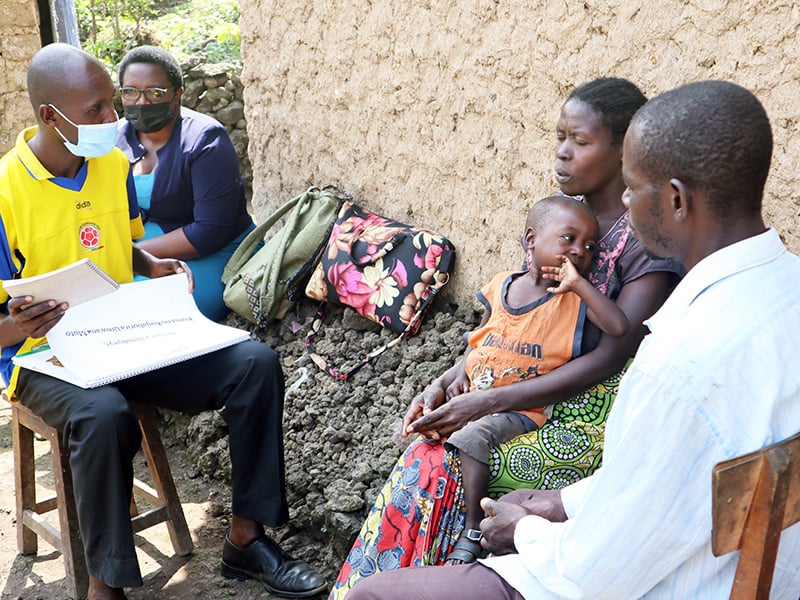
Jean Claude had been selected and trained as a peer supporter through the Abarinzi B’imikurire Myiza (ABM), or “The Guardians of Good Growth,” project. ABM equips community and church leaders with knowledge and tools to help improve maternal, infant and child nutrition in Rwanda through peer-to-peer learning.
As part of the program, Jean Claude received training in food selection and preparation, child feeding practices, the importance of father involvement in child health and nutrition and household hygiene and sanitation.
Equipped with this knowledge, Jean Claude visited Epiphanie and Jeremy frequently to share what he had learned. He helped them plant and tend a kitchen garden capable of growing nutritious food with little maintenance and water. He also provided coaching on healthy practices for feeding a growing family. Within four months, Epiphanie and Jeremy had a garden full of mature, leafy green vegetables!
They were especially amazed that the water from their hand washing could sustain the garden in the dry season, and that the crops would endure even heavy rains.
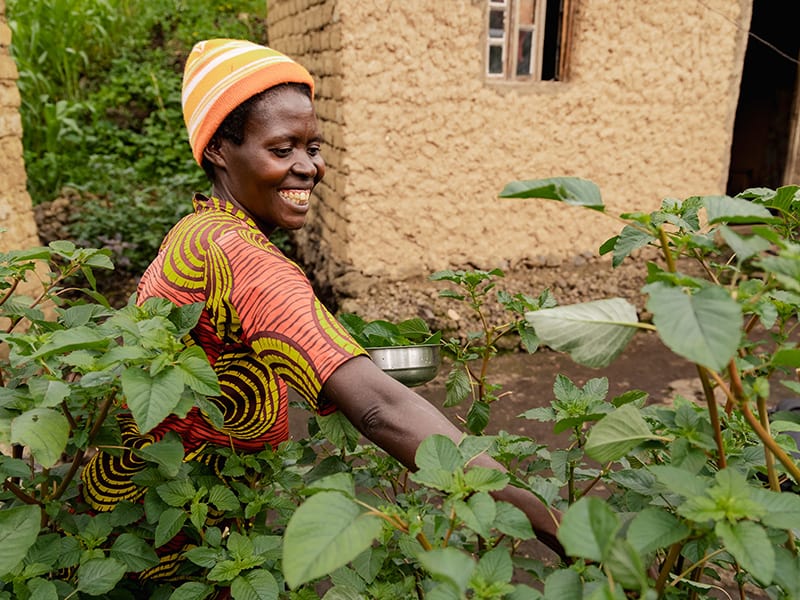
Jean Claude also influenced Jeremy to change the way he spent the money he earned from odd jobs. “I used to spend money buying beer, sugar canes and ignore purchasing nutritious food for my family,” Jeremy explained. “After being trained on kitchen gardening, food preparation and food selection, I changed my priorities. I no longer buy alcohol in replacement of food. I try my best to provide different kinds of food varieties to my family on a daily basis. My wife and children need it, as well as me.”
Creating Climate Resilience Together
Now, Epiphanie and Jeremy are seeing the health of their family transformed in spite of the impacts of climate change. With more vegetables, protein and nutrients in his diet, Aphrodis has grown stronger and now runs around playing with other children.
Together, we have reached approximately 1,456 children like Aphrodis through ABM. Among them, we have seen a 20.9% increase in children ages 6 to 23 months consuming more frequent and diverse meals. We have also seen significant improvements in hygiene practices — among those who received peer-to-peer coaching from volunteers like Jean Claude, over 95% say they wash their hands at key moments, as compared to only 45% in the control group.
While Epiphanie and Jeremy’s lives are still impacted by a changing climate, they are raising healthy children and coping well, surrounded by a community of support thanks to Jean Claude, World Relief and generous people like you.
Read more about the impacts of climate change on poorer communities and how World Relief is responding.
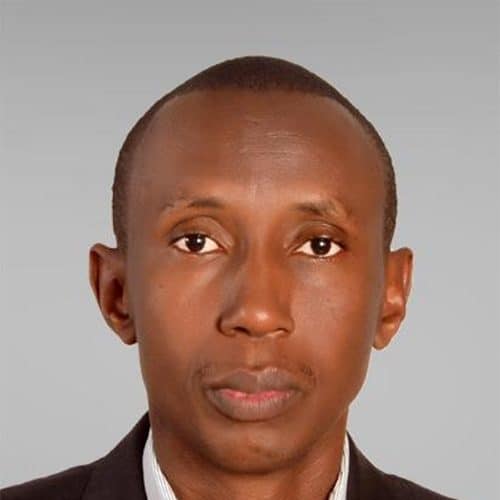
James Munanura is the Senior Manager for Health and Social Protection at World Relief Rwanda. With a research background at the University of Rwanda and Makerere University in Uganda, he provides leadership and technical support to nutrition and health related projects. He assisted with the development and direct management of the peer-to-peer Abarinzi B’imikurire Myiza project.
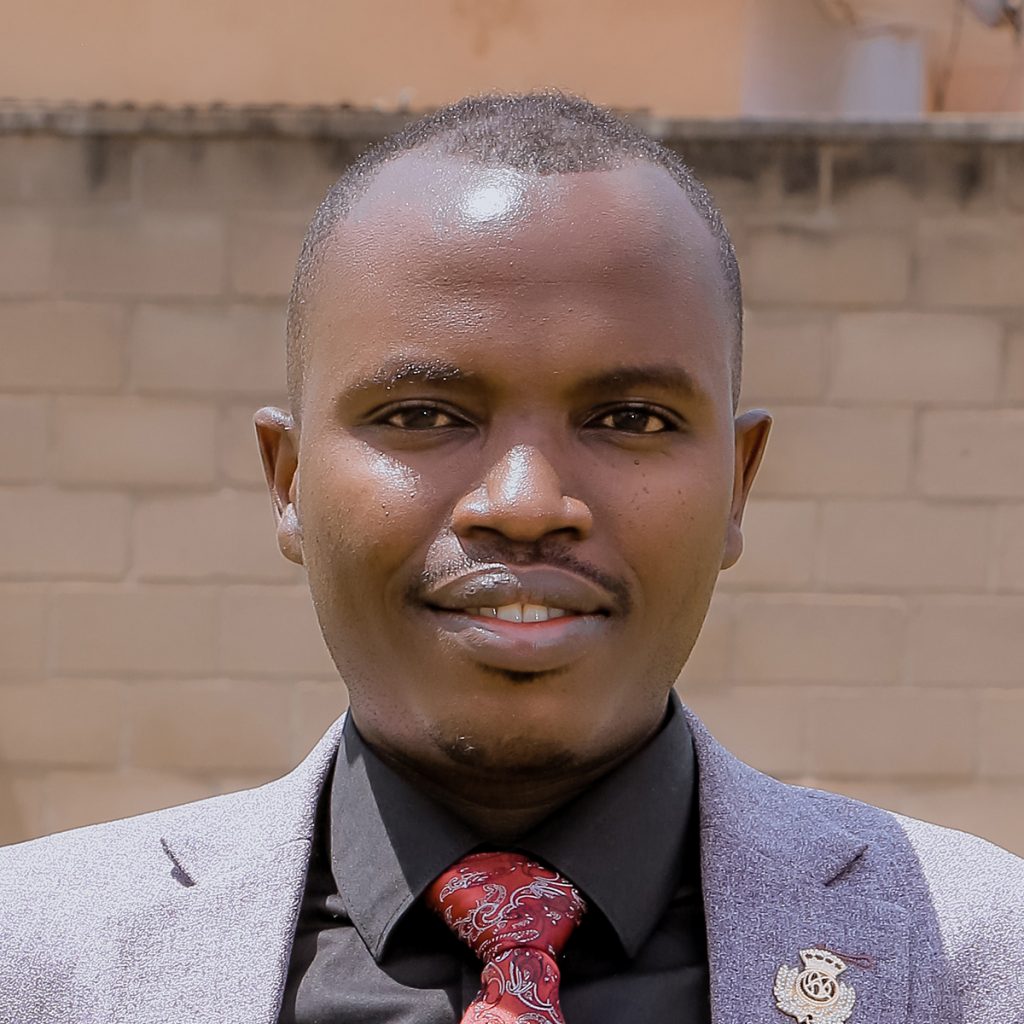
Jean Paul Niyitanga is the Communications and Operations Coordinator at World Relief Rwanda for the USAID-supported SCOPE Project. With a background in Journalism and Communications and a passion for serving the vulnerable, he began working at World Relief Rwanda in 2021. He has also served as a Communications Coordinator for UN-funded projects, including the Acceleration of Integrated Social Protection Interventions in Rwanda (AISPR) project and Maternal Infant and Young Child Nutrition (MIYCN) project.

Emily Kankindi is the Communications and Documentation Unit Coordinator at World Relief Rwanda and is also serving as acting Program Officer for Burundi, Rwanda and Kenya. She started with World Relief in 2005 and has been growing through different roles while pursuing a career in creative communications. Driven by a mission to serve the most vulnerable, Emily has a passion for telling stories of impact and using all forms of communication to inspire others to care for and serve those in need. Her educational background is in marketing and travel operations.
Q&A with Ukraine Response Coordinator Robert Hessenauer
February 2023 marks the one-year anniversary of the war in Ukraine. From the beginning, the global community of World Relief has been responding — welcoming Ukrainians seeking safety in the U.S. and working alongside Christian agencies and churches in Ukraine and the surrounding countries of Slovakia, Poland, Romania and Moldova to support those displaced by the ongoing war.
Over the past several months, it has become clear that a long-term presence in Ukraine is needed in addition to the current and future support of Ukrainians now living in Chicagoland. World Relief has been called to respond.
How World Relief Chicagoland is responding locally.
Here in Chicagoland, World Relief has welcomed and served over 1,200 Ukrainians through our offices in Chicago, DuPage County, and Aurora. We anticipate the arrival of many more in the months ahead. Illinois is the second most requested state for Ukrainians seeking safety in the US, with the vast majority coming to the Chicagoland area.
This past year we launched a new team focused on serving Ukrainians, supporting sponsors, and partnering with Ukrainian churches. Through strategically partnering with people like you and with local churches and community agencies within and beyond the Ukrainian community, we know that we can continue to welcome and serve the growing numbers of Ukrainians arriving in Chicagoland who are searching for a safe place to live.
To learn more about our local response, click here.
How World Relief is responding around the region of Ukraine.
To lead our ongoing response in the region around Ukraine, Robert Hessenauer was welcomed into the role of Ukraine Response Coordinator. Following is an excerpt from his interview about what World Relief hopes to accomplish in the region.
Why should Americans care about what’s going on in Ukraine?
Since most of us live an ocean away, it’s easy for Americans to fall victim to the news cycle and assume that the suffering experienced across Ukraine is new. In reality, the Russo-Ukrainian War has been ongoing since 2014, wreaking social and economic havoc across the country for nearly a decade. Now that missiles are flying, Ukraine’s already-vulnerable communities are in a very fragile state. It’s hard to find work, electricity is scarce and many struggle to find reliable hot water or shelter.

What’s more, Ukraine’s freezing climate makes it unique from most areas where World Relief works. Cold-weather poverty is a challenge that requires speed and resilience but also patience and prayer. I believe that we should care not only because we as Christians are called to serve the most vulnerable, but also because the challenges Ukraine is facing are immediate yet deeply complex with many nuances. Therefore, it requires listening, patience and grace when hearing the news and responding to needs.
How is World Relief planning to tackle these complex challenges in the coming year?
So far, World Relief has already developed close relationships with partners across Romania, Poland, Hungary and Slovakia. Moving forward, we plan to build partnerships with organizations based in Ukraine itself. Thankfully, World Relief’s emergency response to Ukraine with regional partners lends us both the expertise we need in areas such as winterization and food shipment as well as key relationships we’ll be able to leverage as we carry out cross-border refugee assistance.
Once firmly established in Ukraine, we will launch a needs assessment, which will include learning from local churches, organizations and government officials about how World Relief can leverage its capacity and partnerships — both current and future — to serve the community. We plan for food and NFI (non-food items such as blankets and cooking items) assistance and winterization aid to be the core pillars of our work in the short-term.
Can you share something about one of these regional partners World Relief is working with?
World Relief has been on the ground in Romania working with a local partner called Fight For Freedom (FFF). Though FFF started as a prison and homelessness ministry, they pivoted to humanitarian aid for refugees when Ukrainians arrived near the border with very specific needs.
FFF has grown tremendously since last February. I’ve witnessed their staff really pour out their hearts for Ukrainians, sacrificing so much for their neighbors up north. Their work has also received recognition from Ukraine’s government, which has requested their help in receiving refugee children from Kyiv and Odessa.
Already, FFF has received 200 children from Ukraine and found temporarily housing until they are able to return home. And this is in a country whose border disputes, language barriers and other cultural divisions with Ukraine have made direct refugee responses to its citizens very challenging.
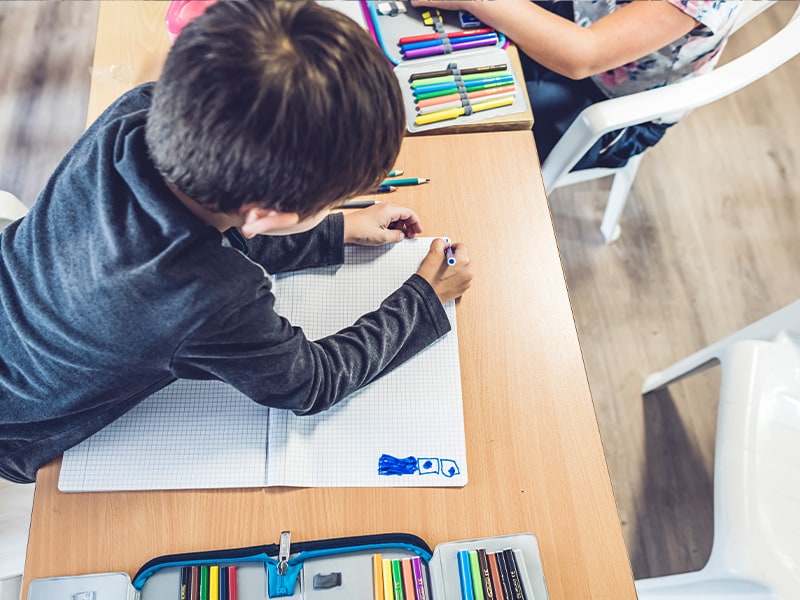
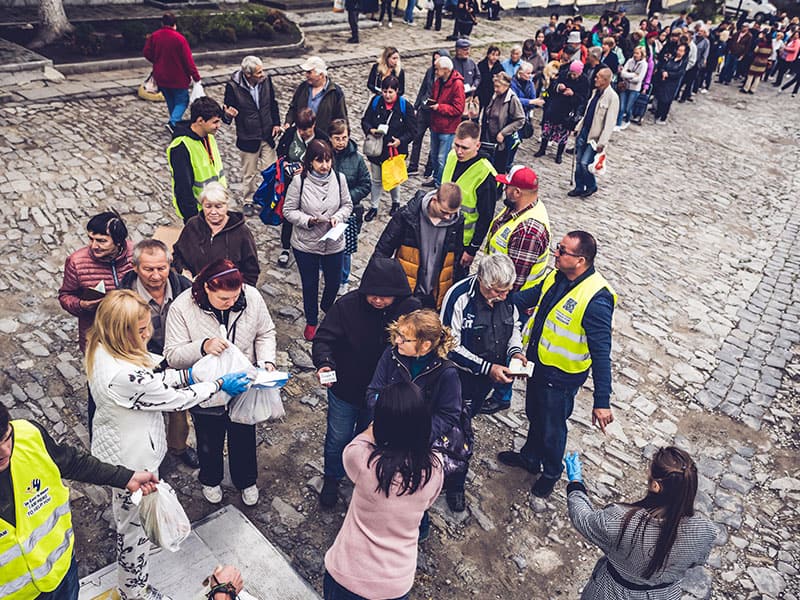
What unique role do you see us playing as we establish a presence in Ukraine?
I think that World Relief fills a niche that no other organization can fill in Ukraine for two reasons. First, we have a unique relationship and a high level of credibility with churches around the world, allowing us to respond quickly to the needs of fleeing Ukrainians rather than starting from scratch. Second, World Relief has been working in the United States to help resettle Ukrainian refugees for nearly 20 years, giving us insight into multiple sides of their struggles and stories. Both these things allow us to connect with Ukrainians and meet them in the midst of their struggle in ways that others cannot.
Learn how you can make a difference by becoming a Ukranian sponsor.
How can we be praying for Ukraine right now?
I would be grateful if readers prayed for faithful, compassionate team members as the Ukraine team grows and expands in the region. Please also pray for the safety of the local organizations and World Relief’s partners as they do their work in Ukraine, move across borders and meet the needs of Ukrainians. Lastly, I’d ask that our readers pray for the churches of Ukraine — that they are able to continually rely on Christ and look to him for strength and guidance in the midst of these desperate times.

We are grateful for Robert and all of our staff across the globe who go further to meet those in need. By giving monthly or a one time gift, you can help us serve even more people here in Chicagoland as we move forward together.
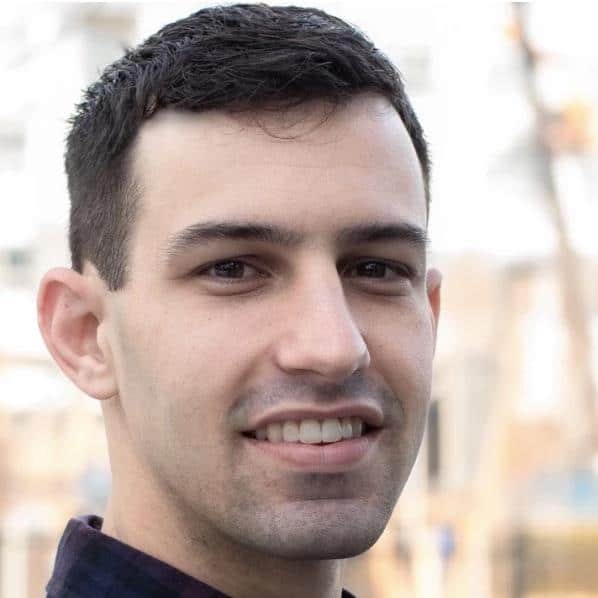
Sam Pence serves as a Partnership Content Specialist at World Relief and has a passion for seeing communities transformed through radical kinship, faith and service. He lives in Washington, D.C. and enjoys running, reading, and writing songs when not working alongside his incredible World Relief teammates.
Going Further: Q&A with Ukraine Response Coordinator Robert Hessenauer
February 2023 marks the 1-year anniversary of the war in Ukraine. From the beginning, World Relief has been responding — welcoming Ukrainians seeking safety in the U.S. and working alongside Christian agencies and churches in Ukraine and the surrounding countries of Slovakia, Poland, Romania and Moldova to support those displaced by the ongoing war.
Our partners have been running refugee shelters, providing transportation to those who are fleeing, sending convoys of food and supplies into Ukraine and providing emergency humanitarian aid to those in greatest need.
Over the past several months, it has become clear that a long-term presence in Ukraine is needed and that World Relief has been called to respond.
To lead our ongoing response in the region, we recently welcomed Robert Hessenauer into the role of Ukraine Response Coordinator. We sat down with Robert to learn more about what led him to this work, his heart for those suffering in Ukraine and what World Relief hopes to accomplish in the region.
Thank you for speaking with us, Robert. Could you start by telling us a bit about yourself and how you came to World Relief?
I grew up in the Philadelphia area and went to college to study business. After learning more about the international development field, I switched majors, and soon after that heard about World Relief. I’d never heard of any Christian organization doing development work the way World Relief did, and from that moment on, I became intrigued by our mission.
In college, I spent a semester abroad working with Compassion International in Uganda. While there, one of my host family’s sons died from a treatable disease, awakening me to the need and the call God placed on my heart to respond to the suffering around me.
After college, I worked for a homeless shelter before enrolling in my graduate studies. While there, I met my wife, got married and took a job with the Mennonite Central Committee. Since I loved the time I’d spent in Uganda, I hoped to serve abroad again. So when the role of Ukraine Country Director opened up, I leapt at the opportunity. I served in that role for two years, allowing me to become comfortable in the local language and for our family to adapt and immerse ourselves in the culture.
Now that I’m with World Relief, the Response Coordinator position feels like a homecoming. My family has a big heart for Ukraine and we’re so happy to be back.
Can you tell us about something that’s inspired you since starting your new role?
World Relief has been on the ground in Romania working with a local partner called Fight For Freedom (FFF). Though FFF started as a prison and homelessness ministry, they pivoted to humanitarian aid for refugees when Ukrainians arrived near the border with very specific needs.
FFF has grown tremendously since last February. I’ve witnessed their staff really pour out their hearts for Ukrainians, sacrificing so much for their neighbors up north. Their work has also received recognition from Ukraine’s government, which has requested their help in receiving refugee children from Kyiv and Odessa.
Already, FFF has received 200 children from Ukraine and found temporarily housing until they are able to return home. And this is in a country whose border disputes, language barriers and other cultural divisions with Ukraine have made direct refugee responses to its citizens very challenging.

Why should Americans care about what’s going on in Ukraine?
Since most of us live an ocean away, it’s easy for Americans to fall victim to the news cycle and assume that the suffering experienced across Ukraine is new. In reality, the Russo-Ukrainian War has been ongoing since 2014, wreaking social and economic havoc across the country for nearly a decade. Now that missiles are flying, Ukraine’s already-vulnerable communities are in a very fragile state. It’s hard to find work, electricity is scarce and many struggle to find reliable hot water or shelter.
What’s more, Ukraine’s freezing climate makes it unique from most areas where World Relief works. Cold-weather poverty is a challenge that requires speed and resilience but also patience and prayer. I believe that we should care not only because we as Christians are called to serve the most vulnerable, but also because the challenges Ukraine is facing are immediate yet deeply complex with many nuances. Therefore, it requires listening, patience and grace when hearing the news and responding to needs.
How is World Relief planning to tackle these complex challenges in the coming year?
So far, World Relief has already developed close relationships with partners across Romania, Poland, Hungary and Slovakia. Moving forward, we plan to build partnerships with organizations based in Ukraine itself. Thankfully, World Relief’s emergency response to Ukraine with regional partners lends us both the expertise we need in areas such as winterization and food shipment as well as key relationships we’ll be able to leverage as we carry out cross-border refugee assistance.
Once firmly established in Ukraine, we will launch a needs assessment, which will include learning from local churches, organizations and government officials about how World Relief can leverage its capacity and partnerships — both current and future — to serve the community. We plan for food and NFI (non-food items such as blankets and cooking items) assistance and winterization aid to be the core pillars of our work in the short-term.

What unique role do you see us playing as we establish a presence in Ukraine?
I think that World Relief fills a niche that no other organization can fill in Ukraine for two reasons. First, we have a unique relationship and a high level of credibility with churches around the world, allowing us to respond quickly to the needs of fleeing Ukrainians rather than starting from scratch. Second, World Relief has been working in the United States to help resettle Ukrainian refugees for nearly 20 years, giving us insight into multiple sides of their struggles and stories. Both these things allow us to connect with Ukrainians and meet them in the midst of their struggle in ways that others cannot.
How can we be praying for Ukraine right now?
I would be grateful if readers prayed for faithful, compassionate team members as the Ukraine team grows and expands in the region. Please also pray for the safety of the local organizations and World Relief’s partners as they do their work in Ukraine, move across borders and meet the needs of Ukrainians. Lastly, I’d ask that our readers pray for the churches of Ukraine — that they are able to continually rely on Christ and look to him for strength and guidance in the midst of these desperate times.
We are grateful for Robert and all of our staff across the globe who go further to meet those in need. By giving monthly or a one time gift, you can help us reach even more people in more places as we move forward together.

Sam Pence serves as a Partnership Content Specialist at World Relief and has a passion for seeing communities transformed through radical kinship, faith and service. He lives in Washington, D.C. and enjoys running, reading, and writing songs when not working alongside his incredible World Relief teammates.










